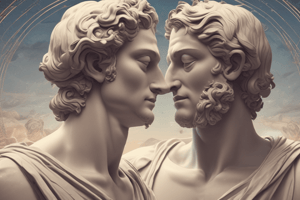Podcast
Questions and Answers
Platonic love ésí á type of love that is non-romantic and non-______
Platonic love ésí á type of love that is non-romantic and non-______
sexual
Plato, who explored the concept of platonic love in his ______
Plato, who explored the concept of platonic love in his ______
works
Philia is a type of platonic love that refers to a deep and lasting ______
Philia is a type of platonic love that refers to a deep and lasting ______
friendship
Mutual ______ and trust are key features of platonic love
Mutual ______ and trust are key features of platonic love
In ancient Greece, platonic love was seen as a superior form of love, as it was not driven by ______ desires
In ancient Greece, platonic love was seen as a superior form of love, as it was not driven by ______ desires
Kàkýɛ́ ɛ́ múscle ɛ́ systém èwà ɛ́ múscle 640 ɛ́ múscle ɛ́ bɔ̀ ndɔ́ ànɔ̀ 40% ɛ́ bɔ̀dy wèight
Kàkýɛ́ ɛ́ múscle ɛ́ systém èwà ɛ́ múscle 640 ɛ́ múscle ɛ́ bɔ̀ ndɔ́ ànɔ̀ 40% ɛ́ bɔ̀dy wèight
Múscle ɛ́ fɩ́bɛ̀r èwà ɛ́ múscle fɩ́nctiɔ̀nál ɛ́nìt ɛ́ múscle
Múscle ɛ́ fɩ́bɛ̀r èwà ɛ́ múscle fɩ́nctiɔ̀nál ɛ́nìt ɛ́ múscle
Múscle ______ kontráctiɔ̀n èwà ______ prócés ______ múscle ______ généráte fɔ̀rs
Múscle ______ kontráctiɔ̀n èwà ______ prócés ______ múscle ______ généráte fɔ̀rs
Múscle ɛ́ dystrophì ɛ́ grúùp ɛ́ génétìk dísɔ̀rdɛ̀r ɛ́ múscle wɛ̀knɛ̀ss ɛ́ dégénéráte
Múscle ɛ́ dystrophì ɛ́ grúùp ɛ́ génétìk dísɔ̀rdɛ̀r ɛ́ múscle wɛ̀knɛ̀ss ɛ́ dégénéráte
Múscle ɛ́ stàbìlìzátɛ̀ ɛ́ múscle ______ ɛ́ máíntɛ̀n póstúr ɛ́ stàbìlìz ɛ́ jòínt
Múscle ɛ́ stàbìlìzátɛ̀ ɛ́ múscle ______ ɛ́ máíntɛ̀n póstúr ɛ́ stàbìlìz ɛ́ jòínt
Flashcards are hidden until you start studying
Study Notes
Platonic Love
Definition
- Platonic love is a type of love that is non-romantic and non-sexual
- Named after the ancient Greek philosopher Plato, who explored the concept in his works
Characteristics
- Friendship-based love that is deep and enduring
- Lacking in romantic or erotic feelings
- Focus on emotional connection, shared values, and intellectual companionship
Forms of Platonic Love
- Philia (friendship love): a deep and lasting friendship
- Storge (familial love): love and affection within family relationships
- Ludus (playful love): a light and playful affection, often seen in casual friendships
Key Features
- Mutual respect and trust
- Emotional intimacy and support
- Shared activities and interests
- Lack of possessiveness or jealousy
Platonic Love in Relationships
- Can be a foundation for strong and healthy friendships
- Can coexist with romantic love in relationships, providing a deeper emotional connection
- Can be a source of comfort and support in times of need
Historical Context
- Plato's philosophy emphasized the importance of platonic love in achieving a higher level of understanding and connection
- In ancient Greece, platonic love was seen as a superior form of love, as it was not driven by base desires or self-interest
Ɛndɛ Platonic Love
Ɛɛkɛ Definition
- Ɛndɛ platonic love ɛtɛ non-romantic ɛtɛ non-sexual
- Ɛntɛnɛ name Plato, ɛfilɛsofɛ ancient Greek, ɛnɛ ɛwɛ exploring concept ɛnɛ work
Ɛnɛ Characteristics
- Friendship-based love ɛtɛ deep ɛtɛ enduring
- Lacking ɛnɛ romantic ɛtɛ erotic feelings
- Focus ɛnɛ emotional connection, shared values, ɛtɛ intellectual companionship
Ɛnɛ Forms of Platonic Love
- Philia (friendship love): ɛdeep ɛtɛ lasting friendship
- Storge (familial love): love ɛtɛ affection ɛnɛ family relationships
- Ludus (playful love): ɛlight ɛtɛ playful affection, ɛnɛ casual friendships
Ɛnɛ Key Features
- Mutual respect ɛtɛ trust
- Emotional intimacy ɛtɛ support
- Shared activities ɛtɛ interests
- Lack ɛnɛ possessiveness ɛtɛ jealousy
Ɛnɛ Platonic Love ɛnɛ Relationships
- Can ɛbe foundation ɛnɛ strong ɛtɛ healthy friendships
- Can ɛcoexist ɛnɛ romantic love ɛnɛ relationships, providing ɛdeeper emotional connection
- Can ɛbe source ɛnɛ comfort ɛtɛ support ɛnɛ times ɛnɛ need
Ɛnɛ Historical Context
- Plato's philosophy ɛnɛ emphasizing ɛnɛ importance ɛnɛ platonic love ɛnɛ achieving ɛhigher level ɛnɛ understanding ɛtɛ connection
- ɛnɛ ancient Greece, platonic love ɛnɛ seen ɛas superior form ɛnɛ love, ɛas ɛnɛ driven ɛnɛ base desires ɛtɛ self-interest
Muscular System
- Complex system for movement, posture, and temperature regulation
Types of Muscles
- Skeletal Muscles (Striated Muscles)
- Voluntary, attached to bones, helps move skeleton (e.g., biceps, quadriceps, hamstrings)
- Smooth Muscles (Non-Striated Muscles)
- Involuntary, surrounds hollow organs, helps move substances (e.g., digestive tract, blood vessels)
- Cardiac Muscles
- Involuntary, makes up the heart, pumps blood throughout the body
Muscle Structure
- Muscle Fiber: functional unit
- Composed of myofibrils, sarcoplasm, and sarcoplasmic reticulum
- Myofibril: long, cylindrical structure
- Composed of sarcomeres, functional units of contraction
Muscle Functions
- Movement: works with bones to move skeleton
- Stabilization: maintains posture, stabilizes joints
- Regulation of Body Temperature: generates heat through shivering
- Support: supports internal organs, maintains position
Muscle Physiology
- Muscle Contraction: generates force
- Sliding filament theory: actin and myosin filaments slide past each other
- Muscle Relaxation: returns to relaxed state
- Breakdown of actin-myosin complex
Muscle Disorders and Diseases
- Muscular Dystrophy: genetic disorders causing muscle weakness, degeneration
- Myasthenia Gravis: autoimmune disorder causing muscle weakness, fatigue
- Rhabdomyolysis: muscle tissue breaks down, releases into bloodstream
Studying That Suits You
Use AI to generate personalized quizzes and flashcards to suit your learning preferences.




